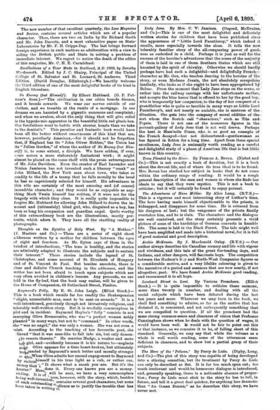Raymond's Polly. By E. St. John Leigh. (Elliot Stock.)— This
is a book which recalls far too readily the Shakespearian "slight, unmeritable man, meet to be sent on errands." It is a well-intentioned, genuinely though not intrusively religious, and tolerably well-written story. But, it is woefully commonplace in plot and in incident. Raymond Hayles's " folly " consists in not marrying Olive Brenacombe, who was "a perfect woman nobly planned" in many ways, but not to "command." In other words, she "was no angel," she was only a woman. She was not even a laint. According to the teaching of her favourite poet, she slieved "that it was man-like to fall into sin, but only demon- ist° remain therein." He marries Madge, a.weaker and more
h girl, and—evidently because it is his nature to—neglects
sb Olive appears for a time heart-broken; but ultimately tao esoled by Raymond's much better and morally stronger hilyirhen Olive admits her second engagement to Raymond by eiciaiibimself in his true light as a cub, or rather cur, money that It shows what a sneak you are. But it's the bunter.. Her6clone it. Every one knows you are a money. ending. It is of will be seen, we have a very commonplace being we11_inteni2ece, however, with the story, which, besides of such oniatanding econtains several good characters, but none been taken in writthg iallt. ence as to justify the trouble that has






































 Previous page
Previous page